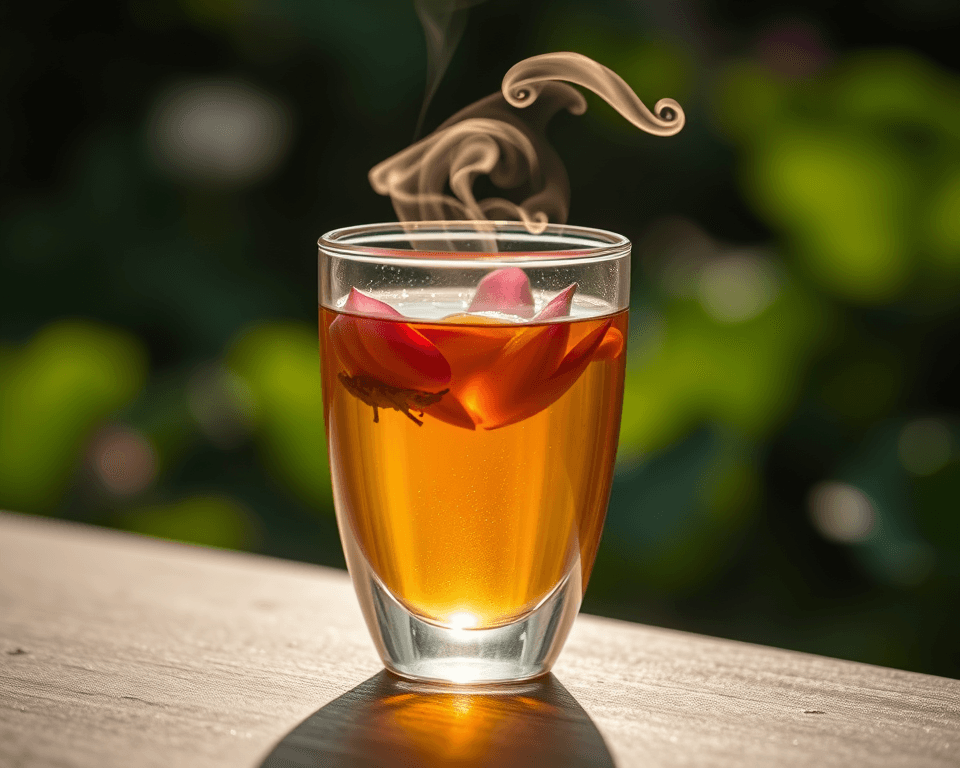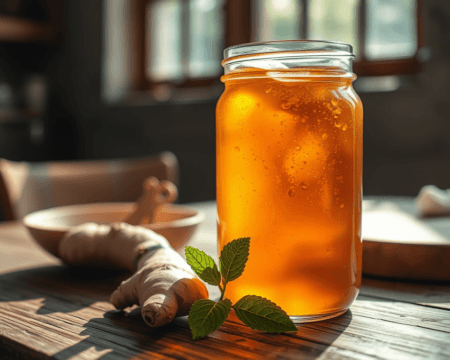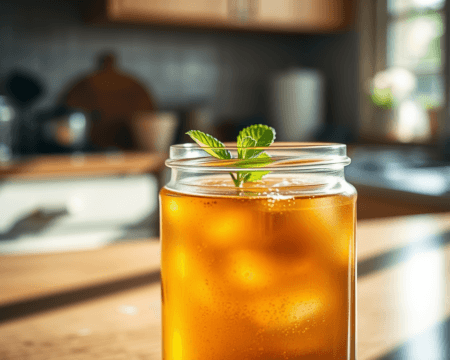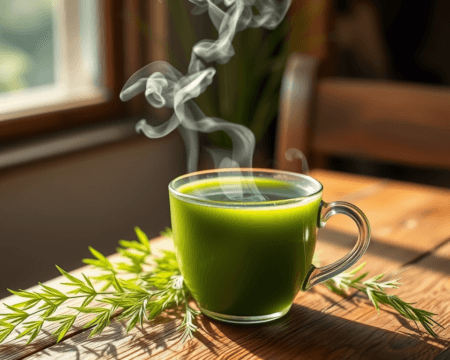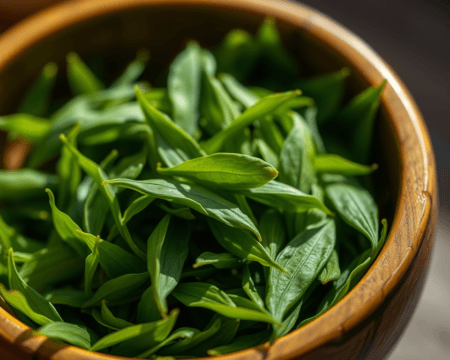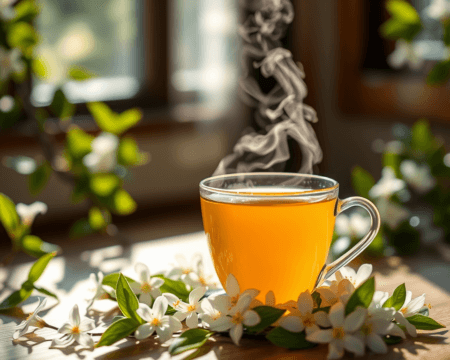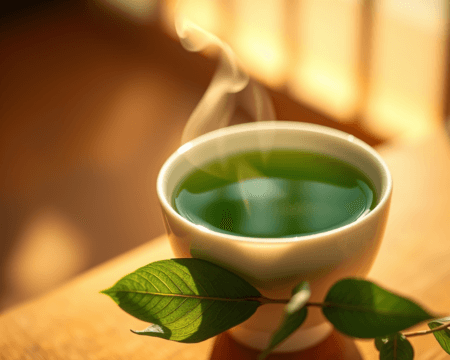Lotus tea isn’t your average brew; it’s a game-changer in the world of herbal teas. Picture this: a delicate infusion made from the exquisite lotus plant, a beverage steeped in history and wellness benefits. If you’re curious about whether this enchanting drink packs a caffeine punch or if it’s entirely free of stimulants, you’re in the right spot. Get ready to explore the depths of lotus tea, its properties, health benefits, and the truth about its caffeine content—all while sipping on the best cuppa you can make!
Key Takeaways
- Lotus tea is caffeine-free, making it a perfect choice for anyone looking to avoid stimulants.
- It boasts numerous health benefits, including antioxidants and stress relief properties.
- Preparing lotus tea is an art that can enhance its flavor and health benefits—don’t skim on the details!
Understanding Lotus Tea
Definition and Origin of Lotus Tea
Lotus tea comes straight from the beautiful lotus plant, primarily using its leaves and flowers. This flower infusion isn’t just a pretty face; its historical use spans back thousands of years in Asian cultures, where it’s been cherished not just as a drink but as a symbol of purity and wellness. Let’s get serious for a moment: it’s more than just herbal tea; it’s a whole tea culture experience.
You’ll find varieties of lotus tea crafted from different parts of the plant. Whether it’s the lotus leaves for a mild taste or dried lotus flowers for an aromatic kick, the preparation can vary greatly. Each regional approach to making this drink offers a unique flavor profile and set of benefits. This diversity is what makes lotus tea such an exciting addition to any tea lover’s collection.
Types of Lotus Tea
There’s no shortage of options when it comes to lotus tea. You’ve got various types that bring different benefits and flavors to the table. Here’s how they stack up:
Green Lotus Tea: This type is made from young leaves and is renowned for its fresh, grassy flavor. It’s packed with antioxidants and a great option for morning energy.
White Lotus Tea: Made from the flower petals, this one has a subtler taste and can be fantastic for relaxation. Think gentle aromas and calming effects.
Lotus Root Tea: Yes, the root! It’s commonly used in Asian cuisine and makes an excellent addition to tea for those who love a more robust flavor and additional fiber benefits.
Getting to know these varieties gives you the power to choose based on your mood and health goals. Each type has its own unique properties, and experimenting with different flavors can be a delightful adventure.
Caffeine Content in Lotus Tea
Does Lotus Tea Have Caffeine?
Let’s cut to the chase: Lotus tea is 100% caffeine-free. That’s right! You can sip as much as you like, whether it’s noon or midnight. This makes lotus tea an ideal option for anyone sensitive to caffeine or for those looking to unwind after a long day without the jitters that come with other traditional teas.
You might be wondering how it stacks against those popular pick-me-ups like black and green teas. To give you a clearer picture, here’s what you need to know:
Traditional Teas: Black tea has about 40-70 mg of caffeine per cup, while green tea hovers around 20-45 mg. When you compare these levels, it’s clear why lotus tea stands out as a caffeine-free alternative.
Herbal vs. Traditional: Many people misunderstand herbal teas, thinking they might contain caffeine just because they’re brewed like traditional teas. Lotus tea sets the record straight: it’s a totally different ballgame.
So, next time someone asks if lotus tea can give them an energy boost, you can confidently say, “Not unless it’s the soothing kind!”
Comparison with Other Teas
When you want a quality tea experience, it helps to know how different types measure up in terms of caffeine content. Here’s a snapshot, just for you:
| Tea Type | Typical Caffeine Content |
|---|---|
| Lotus Tea | 0 mg |
| Black Tea | 40-70 mg |
| Green Tea | 20-45 mg |
| Herbal Teas | 0-10 mg (varies by type) |
As you can see, lotus tea reigns supreme if you’re looking for something entirely caffeine-free! This makes it a fantastic substitute for those evenings when you swear off caffeine to ensure a good night’s sleep.
Health Benefits of Lotus Tea
Nutritional Properties of Lotus Tea
Now that you’re up-to-speed on the caffeine deal, let’s chat about what makes lotus tea not just a tasty drink but a powerhouse of health benefits. First off, let’s get clear on its nutritional properties.
Lotus tea is loaded with antioxidants—that’s what you want in a tea if you’re looking to combat oxidative stress and free radicals in your body. It also packs in some vital vitamins and minerals that can support overall health. This isn’t just about hydration; it’s about nurturing your body with dietary benefits.
Studies show that drinking lotus tea can help with digestion and provide medicinal properties that enhance your well-being. Plus, it’s refreshing, making it perfect hot or iced!
Holistic Health Benefits
But wait, it gets even better. Lotus tea is known for its therapeutic effects. Imagine sipping on a warm cup after a long, stressful day. The stress just melts away. That’s not just your imagination; this tea can promote relaxation and inner peace.
Stress Relief: With its calming nature, lotus tea has been used in various wellness practices as a natural way to unwind.
Improved Digestion: Many fans of this tea report better digestion after regular consumption. That’s a win-win for your gut health!
Energetic Balance: It’s all about that mind-body connection. This tea can keep you grounded while allowing you to let go of negative energy.
Incorporating this lovely brew into your daily routine might just be the refreshing change you need.
Preparing Lotus Tea: Tips and Techniques
Best Practices for Brewing Lotus Tea
Let’s talk brewing. Making lotus tea isn’t rocket science, but there are some best practices that’ll elevate your tea game to a whole new level.
Water Temperature: Use water that’s hot but not boiling—around 190°F (88°C) is perfect. This helps preserve the delicate flavors without scalding the leaves.
Brewing Time: Aim for a steep of about 5-7 minutes. You want to extract all those glorious properties without overdoing it.
Ratios: A teaspoon of dried lotus leaves per cup is a good starting point. Experiment a bit to see what suits your taste buds!
Making a great cup of lotus tea is about finding that sweet spot in flavors while reaping the benefits.
Enhancing Flavor and Benefits
If you want to amp up your lotus tea experience, consider adding some complementary ingredients. Ginger adds a warmth that’s revitalizing, while a bit of honey can sweeten the deal. You can also explore herbal blend recipes that pair well with lotus.
Recipe Idea: Try adding lemongrass for a citrusy twist or peppermint leaves for a refreshing lift.
Health-Boosting Combinations: Combine lotus tea with other herbal teas. A blend with chamomile can enhance relaxation while keeping the health benefits intact.
Experimenting with flavors isn’t just about taste; it’s about turning a simple cup into a ritual that uplifts your spirits and health to new heights.
Myths and Facts About Caffeine in Teas
Common Misconceptions about Tea and Caffeine
People are quick to lump all teas together when it comes to caffeine, and that’s where the confusion starts. Let’s set the record straight: not all tea is created equal! Lotus tea is a prime example of how this misconception can lead folks astray.
You might hear myths about herbal tea being packed with caffeine just because they’re enjoyed similarly to traditional teas. This is simply not true. Knowing the facts can empower you to make better choices when selecting your tea.
Realities of Herbal Tea Consumption
Let’s break down a few truths about herbal tea, specifically lotus tea, so you set the right expectations.
Herbal Teas Are Generally Caffeine-Free: Most are derived from plants, flowers, and spices that don’t naturally contain caffeine.
Health Literacy: Understanding what you drink is crucial. Equip yourself with knowledge about the benefits and characteristics of herbal options like lotus tea to improve your tea-drinking experience.
In a world full of caffeine-laden options, knowing that lotus tea can offer a peaceful, stimulant-free experience is a game-changer.
Whether you’re a health enthusiast or just someone trying to reduce your caffeine intake, lotus tea serves up a delightful option that checks all your boxes!
Frequently Asked Questions
What is lotus tea made from?
Lotus tea is typically made from the dried leaves or flowers of the lotus plant, specifically from the species Nymphaea. The petals and leaves are steeped in hot water to release their natural flavors and health benefits.
What are the potential health benefits of drinking lotus tea?
Drinking lotus tea is associated with several health benefits, including stress relief, antioxidant properties, improved digestion, and potential support for weight management. It may also promote relaxation and enhance overall well-being.
How can I prepare the perfect cup of lotus tea?
To prepare lotus tea, start by using high-quality dried lotus leaves or flowers. Steep them in hot water (not boiling) for about 5-7 minutes, allowing the flavors to develop. You can enhance the taste with natural sweeteners or lemon if desired.
Is lotus tea safe for everyone to drink?
Lotus tea is generally considered safe for most people. However, those who are pregnant, nursing, or taking specific medications should consult with their healthcare provider before incorporating it into their diet.
Can lotus tea interact with medications?
Lotus tea may interact with certain medications, especially those that affect blood pressure and blood sugar levels. It’s advisable to consult with a medical professional if you’re on medication to ensure it’s safe to consume.
How does lotus tea compare to other herbal teas?
Lotus tea stands out due to its unique combination of flavor and health benefits. Unlike many herbal teas, it is caffeine-free and known for its calming properties, making it a popular choice for relaxation compared to more stimulating herbal options.
Can I drink lotus tea every day?
Yes, lotus tea can generally be enjoyed daily. Its caffeine-free nature makes it an excellent choice for regular consumption. However, as with all herbs and teas, it’s best to enjoy it in moderation and consult a health professional if you have any concerns.
Where can I find high-quality lotus tea?
High-quality lotus tea can be found at specialty herbal shops, health food stores, and online retailers. Look for reputable suppliers that provide organic or sustainably sourced lotus products for the best flavor and health benefits.
Are there any side effects of drinking lotus tea?
While lotus tea is safe for most people, excessive consumption may lead to mild side effects like digestive upset in sensitive individuals. It’s always best to start with small amounts and monitor your body’s response.




